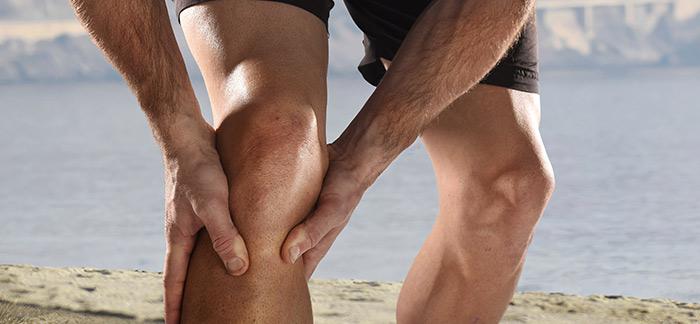
How many of us men have resigned ourselves to the fallacy that old sports injuries will haunt us for the rest of our lives? Unfortunately, most of us.
The truth is, however, that old injuries often recur because we choose to neglect them rather than deal with them. Over time, they can worsen to the extent that they negatively affect our quality of life. If this is the case, it’s time to explore your options – and, encouragingly, there’s usually a quick and easy fix.
The most common recurring injuries that men face are knee pain and lower back pain. Although these injuries may have been sustained years ago while running half-marathons or playing rugby, they’re often aggravated by mid-life weight gain, intermittent as opposed to consistent exercise, random overexertion, and the steady tightening or even weakening of certain key muscle groups.
Knee pain
It’s amazing how quickly a niggling discomfort in your knee while running can turn into a shooting pain that feels like a nail being driven into your joint with each step. In many cases, this is the result of tendonitis (inflammation of tendons around the knee joint) caused by the gradual tightening and shortening of muscles that attach to the knee.
Your first point of call should be to introduce a simple stretching routine into your daily life and especially when you exercise. This routine should include your arms, torso and neck to maintain a degree of suppleness throughout your body.
This would demand nothing more than 10 minutes of your time each evening before going to bed and also incorporating a stretching session into your warm-down routine after exercising. We should all adopt the mindset change that stretching is as important as the exercise itself.
Lower back pain

Lower back pain is another beast that can strike us down at the most inconvenient of times. Something as simple as reaching down to pick up a kid’s toy or throwing a bag of dog food over your shoulder can trigger an explosive shockwave of agony through your back and legs.
The pain can be so excruciating that you’re forced to take an anti-inflammatory and lie down for hours to get some relief.
For those of us who suffer from lower back pain – and there are many of us – we know it can be debilitating to the point that you cannot walk properly, drive a car, or even lift a doughnut. And these episodes can last for days, weeks or even months at a time if not properly attended to.
The most common cause of lower back pain is weakened core muscles. It may sound like a fairy tale, but if you can sort out your core strength, then your back issues will likely drift away into nothing more than a bad memory. Core stabilising exercises are great because you can do them anywhere – while sitting at your desk at work, while driving, or even while lazing in front of the television.
Granted, these ‘lazy exercises’ should be accompanied by at least one dedicated 10-minute core session each day that incorporates a range of exercises which target core muscles. Since our core is what holds our spinal column in place, it should be regarded as one of the most important muscle groups for us to focus our time on.
Ignore injuries at your peril
Although many of us learn to manage our recurring injuries, they shouldn’t be left unattended indefinitely as they can grow ever more serious over time. That sore knee of yours might not be tendonitis, but rather worn-down cartilage. And your sore back might not be a weak core, but rather a pinched nerve.
So, if the properly-implemented solutions suggested above don’t work for you, then you should cast your male pride aside and see someone who can offer further advice.
The professional

A good place to start is your local physiotherapist. These are qualified professionals who understand our body’s muscle make up better than anyone. Their job it is to assess and identify the root causes of our injuries and then apply their industry best practice to solve them.
Physios are acutely aware that recurring injuries are often related to various ‘bad habits’ that creep into our daily lives – like wearing incorrect shoes, crossing our legs while sitting, or slouching over our desks rather than sitting with good posture.
Once your physio understands your injury fully, he/she will explain it to you and then work closely with you to sort it out. This would likely involve scheduled massages and rehabilitation exercises.
You might even be referred to a sports scientist who can fine-tune your specific sport technique to minimise the risk of injury … maybe your running style needs a slight tweak to solve your recurring knee injury; maybe your bicycle frame setup needs a slight modification to improve your riding posture and solve your post-ride back pain.
There are also many people who swear by chiropractors. Chiropractic is a form of alternative medicine that diagnoses and treats mechanical disorders of the musculoskeletal system, especially the spine. This generally involves spinal adjustment/manipulation and also acupuncture – the use of needles to relieve muscle spasms.
All these avenues should be researched and explored by those who suffer from old injuries.
Humans are complex machine
The human body is an extraordinary machine, and like all machines it requires constant care and maintenance. When warning lights go on, we need to take note of them, take time to understand them, and then take action to address them before we stop on the side of the road … literally.
Our bodies are an incredible gift and we should do everything we can to keep them in optimal shape. No more excuses … take charge of your old injury today.
Date Published: 16 October 2018